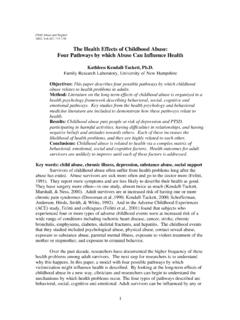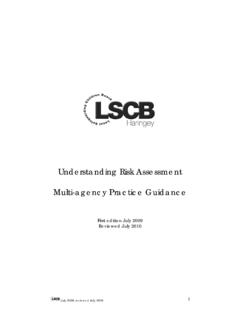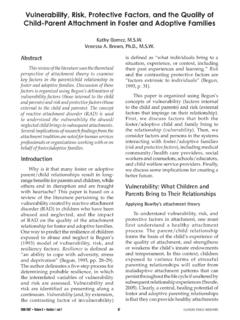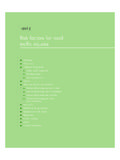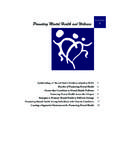Transcription of International Breastfeeding Journal - uppitysciencechick
1 International Breastfeeding Journal BioMed Central Review Open Access A new paradigm for depression in new mothers: the central role of inflammation and how Breastfeeding and anti-inflammatory treatments protect maternal mental health Kathleen Kendall-Tackett*. Address: Family Research Laboratory, 126 Horton Social Science Center, 20 College Road, University of New Hampshire, Durham, New Hampshire, 03824, USA. Email: Kathleen Kendall-Tackett* - * Corresponding author Published: 30 March 2007 Received: 7 September 2006. Accepted: 30 March 2007. International Breastfeeding Journal 2007, 2:6 This article is available from: 2007 Kendall-Tackett; licensee BioMed Central Ltd.
2 This is an Open Access article distributed under the terms of the Creative Commons Attribution License ( ), which permits unrestricted use, distribution, and reproduction in any medium, provided the original work is properly cited. Abstract Background: Research in the field of psychoneuroimmunology (PNI) has revealed that depression is associated with inflammation manifested by increased levels of proinflammatory cytokines. Discussion: The old paradigm described inflammation as simply one of many risk factors for depression. The new paradigm is based on more recent research that has indicated that physical and psychological stressors increase inflammation.
3 These recent studies constitute an important shift in the depression paradigm: inflammation is not simply a risk factor; it is the risk factor that underlies all the others. Moreover, inflammation explains why psychosocial, behavioral and physical risk factors increase the risk of depression. This is true for depression in general and for postpartum depression in particular. Puerperal women are especially vulnerable to these effects because their levels of proinflammatory cytokines significantly increase during the last trimester of pregnancy a time when they are also at high risk for depression.
4 Moreover, common experiences of new motherhood, such as sleep disturbance, postpartum pain, and past or current psychological trauma, act as stressors that cause proinflammatory cytokine levels to rise. Breastfeeding has a protective effect on maternal mental health because it attenuates stress and modulates the inflammatory response. However, Breastfeeding difficulties, such as nipple pain, can increase the risk of depression and must be addressed promptly. Conclusion: PNI research suggests two goals for the prevention and treatment of postpartum depression: reducing maternal stress and reducing inflammation.
5 Breastfeeding and exercise reduce maternal stress and are protective of maternal mood. In addition, most current treatments for depression are anti-inflammatory. These include long-chain omega-3 fatty acids, cognitive therapy, St. John's wort, and conventional antidepressants. Review can even be as high as 40% or 50% [1]. Since depression Depression in new mothers is common in many cultures, has devastating effects on both mother and baby, it's vital affecting anywhere from 10% to 20% of postpartum that it be identified and treated promptly. Depressed women. In some high-risk populations, the percentage mothers are also more likely to stop Breastfeeding with Page 1 of 14.
6 (page number not for citation purposes). International Breastfeeding Journal 2007, 2:6 negative health effects for each [1]. In this paper, I The new paradigm moves the field forward and provides describe a psychoneuroimmunology (PNI) framework for an answer to the next question: why? Why would psycho- depression in new mothers and discuss its implications social risk factors, such as lack of social support or marital for Breastfeeding women. strife or stress, increase the risk of depression? Why would depression be more likely in women who are sleep Inflammation and depression deprived or who have experienced trauma or pain?
7 The In recent years, researchers in the field of PNI have found new paradigm provides perspective on the mechanism by that inflammation is involved in the pathogenesis of which previously identified risk factors increase risk. It depression. Maes and colleagues first documented that also guides practitioners in their intervention efforts and mothers with the postpartum blues had higher levels of suggests that targeting inflammation may increase inflammation than mothers who did not [2]. They con- women's resilience to other stressors. cluded that the postpartum blues were caused by an acti- vated inflammatory response system (IRS).
8 In a later Breastfeeding and depression in mothers paper, Maes and colleagues noted that "it is generally Breastfeeding also has an important role to play in moth- accepted that in the early puerperium, there is an ers' postpartum mental health. Gro r and Davis noted increased inflammatory responsivity in the serum .. sug- that " Breastfeeding confers some psychoneuroimmuno- gesting an activation of the inflammatory response sys- logical benefits to mothers" (p. 599) in part because of its tem" [3] (p. 71). impact on stress [8]. In an earlier review, Gro r, Davis and Hemphill noted that although women experience many When researchers first identified inflammation as increas- stressors in the postpartum period, Breastfeeding protects ing the risk of depression, most considered it an inde- them by inducing calm, lessening maternal reactivity to pendent risk factor along with several others.
9 The other stressors, and increasing nurturing behaviour [9]. The PNI. risk factors included psychosocial stress, a broad category approach is relevant to lactation specialists because it that included significant life changes, lack of social sup- demonstrates that Breastfeeding can protect mothers'. port, marital difficulties, infant illness or prematurity, and mental health and is worth preserving whenever possible. low income. Psychological trauma, another risk factor, includes current trauma or a history of trauma, which cre- Method of literature review ates a vulnerability to future stressors even when there are The studies cited below were assembled from a wide vari- no current symptoms.
10 Sleep disturbance and pain are ety of sources. Literature searches on PubMed and physical stressors that are common among new mothers PsychInfo were conducted on depression, postpartum/. and increase the risk of depression. The model portrayed postnatal depression, depression and inflammation, on Figure 1 shows these as individual risk factors and rep- proinflammatory cytokines, pain, sleep disturbances, resents the old paradigm. HPA dysfunction and depression, trauma, omega-3 fatty acids, inflammation and depression. In addition, several More recent research, however, suggests a new paradigm key PNI and psychiatry journals were manually searched for understanding depression.
